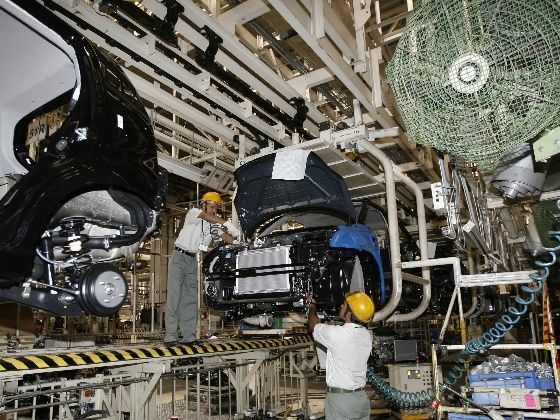
Maruti Suzuki plans to bring up Manesar plant at par with the car maker's Japan facilities by ramping up automation in the press shop to 99 per cent
Maruti Suzuki, India's largest carmaker in terms of market share, is automating certain critical production functions in its manufacturing plants that will bring its Manesar operations on par with its hi-tech plants in Hamamatsu, Japan.
Maruti, which operates two plants at Manesar, is planning 99% automation in the press shop where steel sheets are moulded into door frames and then passed onto the weld shop to hinge them onto the body of the vehicle.
"We gradually plan to automate our plants in India to bring consistency in the quality of our cars. We have already started the process at Manesar's first plant to take automation to the maximum possible 99% level, where the press and weld operations would be on par with the second (manufacturing) facility," chief operating officer (production) at Maruti Suzuki, MM Singh said.
The second facility had started operations from September 2011. In due course, all the new lines coming up in Gurgaon would be automated on similar lines, Singh added.
The carmaker has been steadily increasing automating of its plants in India. In over a decade, the company has doubled the number of robots used in its plants to around 1,500. It will add another 50-100 new robots in the older plant at Manesar to increase automation to 99% from the current 90%. But the company did not reveal by when this process will be completed.
Maruti has increased the automation percentage at its three plants in Gurgaon to 60-65%in the past few years. It had stopped operating two manual production lines at Gurgaon in an effort to move to fully automated operations.
Automation has been a sensitive issue for the country's largest carmaker after a series of perpetual worker's strikes last year and massive violence at its Manesar plant on July 18 that left one senior manager dead and 96 employees seriously injured.
Maruti employs over 10,000 permanent employees and contract workers to manufacture around 1.25 millioncars annually. It has been contemplating various means to minimise human intervention as its aims to modernise its Indian facilities, which now churn out more than 50% of parent Suzuki's global output.
It is also moving away from contract labour and would employ only permanent employees in core manufacturing areas. An analyst from a leading consulting group, who did not want his or his firm's name to be quoted for this story, said that as competition intensifies in the domestic market, Maruti Suzuki would have to invest in technology like automation to help improve quality of the existing product line and reduce dependence on manual labour.
"It has reaped the benefits of automation with popular cars like Swift and DZire gaining segment leadership, while A-Star has been the largest selling export model for the company so far," said Abdul Majeed, partner, auto practice, PWC. "Higher mechanisation would also wean away its need to increase manpower."
"While older models like M800 and Alto are simpler cars to manufacture, the new generation models like Swift, A-Star or Ritz are more complex and need much improved technology and process. Besides, automation is also cost-effective as investment is duly recovered over a period of time unlike the spiraling labour costs," said a senior Maruti executive, preferring not to be named.
Hyundai, Volkswagen and Ford already have highly automated plants in India. "All our new cars are manufactured with strong technology intervention. Our new global fluidic designs are crafted through highly automated operations to churn out specific shapes to our cars that can only be managed through robots," said a senior Hyundai Motor executive. In India, carmakers employ over five workers for every unit rolled out. All automobile and component companies together employ an estimated 1.3 crore workers directly and indirectly.

No comments:
Post a Comment